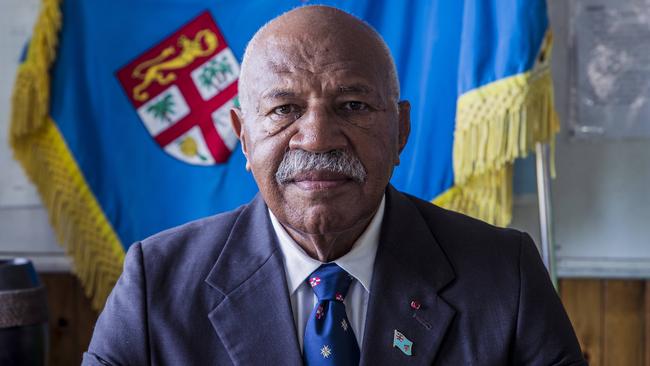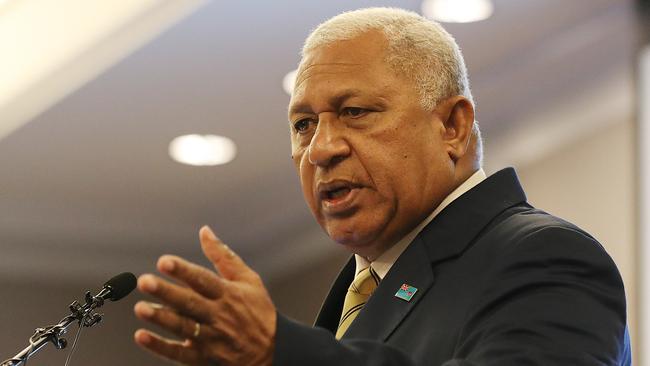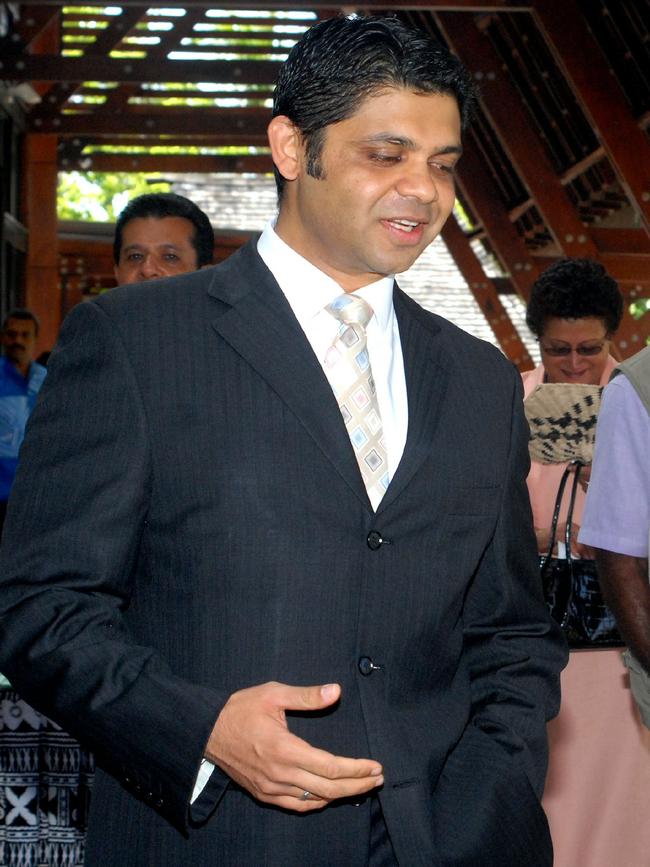Fiji fisticuffs expose China’s no-holds-barred aggression
When fighting broke out between China and Taiwan last year, it was in the most unlikely of places: the ballroom of Fiji’s Grand Pacific Hotel.

When fighting broke out between China and Taiwan last year, it was in the most unlikely of places: the ballroom of Fiji’s Grand Pacific Hotel.
Diplomats and politicians had gathered to celebrate Taiwan’s National Day when two members of the Chinese embassy crashed the reception and began taking photographs of the Taiwanese delegates.
When one of the Taiwanese asked them to leave, they grabbed him and beat him up.
The man was so badly injured he required hospital treatment for concussion, according to witnesses.
Police were called but the two Chinese embassy officials claimed diplomatic immunity.
No further action was taken, and no media outlet in Fiji reported the assault.
There the incident might have stayed – one more deniable projection of Chinese “soft” power in the Pacific – had it not reached the ears of blogger Graham Davis, a former adviser to Fijian Prime Minister Frank Bainimarama.
The Fiji-born Davis, who was Bainimarama’s principal communications director for six years, fell out with his boss after becoming disillusioned by the cronyism, the assaults on the independence of the institutions of state, the crackdowns on the media, and the Fijian government’s fawning approach to China.
Now based in Australia, Davis published the story on his Grubsheet Feejee blogsite.
In the hours after, Grubsheet’s online security protection blocked 186 “malicious log-in attempts”.
Davis has no doubt who was trying to sabotage the story: “The Chinese are masters of cyber warfare,” he says
The Grand Pacific Hotel attack was a test of Bainimarama’s resolve because of his close ties with Beijing – a test, Davis believes, that he failed.
“The two offenders should have been declared persona non grata as soon as possible and been withdrawn from Fiji,” he says.
Next year’s election in Fiji is shaping up as a turning point in China’s efforts to dominate the South Pacific.
It will also be clash of the titans, pitting two sworn enemies in what is likely the last roll of the dice for both of them.

In one corner is Bainimarama, the former navy commander who took power in a coup in 2006, but later reinstated democratic rule to Fiji. In the other is former soldier Sitiveni Rabuka, instigator of two military coups in 1987, but later democratically elected as prime minister from 1992 to 1999.
The animus between the two men runs deep.
Bainimarama calls his hated enemy “The Snake”.
The feud goes back to a 2000 army mutiny at Suva’s Queen Elizabeth Barracks.
Bainimarama, who was then armed forces commander, alleges Rabuka drove to the barracks as the rebellion was under way, with his army uniform hanging in the backseat, ready to take command of the military.
The mutiny evokes strong emotions in Fiji because soldiers from both sides, loyalist and rebels, were gruesomely murdered during the uprising. Rabuka was tried and found not guilty of inciting the mutiny, but Bainimarama and his supporters in the military believe otherwise.
Fiji’s new military commander Major General Jone Kalouniwai – appointed personally by Bainimarama just three months ago – was held prisoner and threatened with execution during the mutiny.
The biggest question in Fiji today is whether the Australian Army-trained Kalouniwai would tolerate a Rabuka-led government.
The highly educated Kalouniwai is well regarded by Australian military leaders and last week hosted ADF chief General Angus Campbell on a goodwill tour of Fiji.
Last year, Kalouniwai backed Bainimarama’s media crackdowns, writing in the Fiji Sun that “in times of national emergency such as this … war against Covid-19, our leaders have good reasons to stifle criticism of their policies by curtailing freedom of speech and freedom of the press”.
Kalouniwai is in a position to call the shots. The Fijian constitution gives the military – not parliament – ultimate responsibility for the security and wellbeing of the people. And many in the military still call Bainimarama “the commander”.
Nor can Rabuka expect much help from the country’s new President, Williame Katonivere, who has delivered increasingly partisan speeches in favour of the Bainimarama government, a distinct departure from convention.
The Prime Minister and his Attorney-General, Aiyaz Sayed-Khaiyum, have already engineered the dismissal of the government’s chief lawyer, the Solicitor-General Sharvada Sharma, for reasons they have not explained, triggering a constitutional crisis.
Few in the media have challenged these developments.

One of the country’s two main newspapers, the Fiji Sun, has been a staunch supporter of Bainimarama. Others have been cowed into silence by laws which make it illegal to publish material “against the public interest or order”, with editors liable for two years in prison and a $25,000 fine.
Opposition figures, including Rabuka, have been detained by police for questioning.
Bainimarama has no doubt been hoping an influx of tourists after a long Covid-19 shutdown would boost his stocks. The Fiji government paid Australian actor Rebel Wilson a reported $1m to front a television advertising campaign wooing visitors back to the country. The arrival of the Omicron variant may sabotage that rescue.
Davis believes his ex-boss’s 15-year rule is coming to an end and Rabuka is in a strong position to win next year’s election.
Many Fijians weren’t even born when Rabuka launched his coups almost 35 years ago, he points out.
“Most of the voters are young,” says Davis. “Race isn’t necessarily the determining factor anymore. One thing that’s happened since Bainimarama’s coup in 2006 is that the concerted attempt to smash down racial barriers has to some extent worked, because there’s just not that much potency in the racially exclusive stuff.”
Davis says Bainimarama is “hardcore” pro-Beijing, recounting an experience at an official reception one evening at State House in Suva when Bainimarama shocked the gathering by telling the then US ambassador Judith Cefkin: “You’re not a true friend of Fiji. See that guy over there” – pointing to the Chinese Ambassador – “now he’s a true friend of Fiji.”
Rabuka tells The Australian he is not planning to change Fiji’s existing one-China policy, alongside a “people-to-people” relationship with the people of Taiwan. But it is clear he would be much more cautious in his dealings with Beijing than his rival.
That is, assuming Bainimarama allowed him to take power after an election victory.
“The Prime Minister is between a rock and a hard place,” says Davis. “Allow a free and fair election and he faces almost certain defeat. Stage another coup and he becomes the Robert Mugabe of the South Seas – reviled and isolated.”
For Rabuka, victory would be the final chapter in the wildest ride in Fijian political history.
From junior army officer to coup leader to prime minister to international villain – and now, perhaps, back again.
He abolished the monarchy and declared Fiji a republic. Then 10 years later, he stood barefoot at a Commonwealth Heads of Government meeting and presented the Queen with the tooth of a sperm whale – a traditional symbol of atonement – and begged forgiveness for breaking his oath of allegiance. Her Majesty graciously accepted the apology.
If the people of Fiji are prepared to follow her lead next year, the story of Fiji’s most perplexing and polarising political figure will have come full circle. And the South Pacific may start to look like a very different place.





To join the conversation, please log in. Don't have an account? Register
Join the conversation, you are commenting as Logout